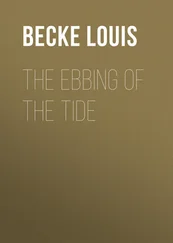Niâbon bent forward and spoke—
“Have no fear, Simi. Neither thou, nor Tematau, nor the people of this village, nor I, shall come to any harm from the German fighting-ship. For when it comes thou and I, and Tematau, and Tepi, who know of the blood let out this day upon the floor of thy house, will be far away. And when the captain of the fighting-ship questioneth, and sayeth to the people, ‘Where is my countryman?’ the people will shake their heads and say, ‘We know not. He and his wife, and the Englishman, and Tepi, and Tematau, and the witch woman Niâbon have gone. They have sailed away to beyond the rim of the sea and the sky—we know not whither.”
I listened with all my faculties wide awake, and yet with a strange sense of helplessness overpowering me. Then Niâbon made a swift gesture to the head men. They rose, and lifting the huge body of Krause, carried it away.
She came to me and pressed her hand on my forehead.
“You are tired,” she said in English. “Lie down.”
She took my hand and led me to my couch beside the window and then bent over me.
“Sleep, sleep long. For now the time is near and thou must have strength.”
I slept well on towards four o’clock in the afternoon, and when I awakened I found the house deserted by all but my man Tepi, who was seated cross-legged near me with a cup containing my fever mixture beside him. He held it up to me silently.
Even before I raised myself to drink I felt that I was a stronger man, physically and mentally, than I had been six hours previously, and my veins no longer seemed as if they were filled with liquid fire. I drank the mixture and then looked about me, and saw that every ensanguined trace of the tragedy which had occurred a few hours before had been removed. The coarse and somewhat worn matting which had covered the floor had been taken away and replaced by new squares, and the room presented the usual neat and orderly appearance in which it was always kept by Tepi and my other servant.
“Master,” said Tepi, “art hungry?”
“Aye,” I replied, “I would eat; but first tell me of the dead man. Who hath taken him away?”
The man, instead of answering me in a straightforward manner, bent his head and muttered something I could not hear.
I jumped off my couch and went outside, and the first person I ran against was my cook, an old grizzled fellow of about sixty years of age named Pai. He was carrying a freshly-killed fowl in his hand, looked at me in an unconcerned manner as if nothing had occurred, and asked me would I have it broiled or boiled.
“As you will,” I said impatiently. “Tell me, Pai, whither have they taken the dead white man?”
He made a peculiar and significant gesture—one that is not often used, but when it is it implies that certain matters or things must not be further alluded to, but must be for ever buried in oblivion. I put my hand on his tough, naked, and wrinkled shoulder, and again repeated my question.
“I know of no dead white man,” he replied, looking me steadily in the face, and yet answering me in his usual respectful manner. Then he sat down beside the low stone wall surrounding the house, and began to pluck the fowl, casually remarking that it was fat for its age.
Somewhat puzzled at the reticence of my servants, I walked across my compound towards the native village, which, as I have before mentioned, was some distance from my house, and as I walked I felt at every footstep a renewed bodily vigour, and almost unconsciously I took out my pipe, filled it, and began to smoke with an enjoyment denied to me for many months.
The day was gloriously bright and cool, and the westering sun on my right hand shone on a sea of the deepest blue, whose placid bosom was dotted by a fleet of canoes with their mat sails spread to the now gentle trade wind, cruising to and fro catching flying fish. This seemed strange to me, bearing in mind the events of the past few hours. The death of a white man, even from natural causes, was of itself generally a matter of such importance to the natives of any of the mid-Pacific isles, that their daily avocations were suspended, and the house of the deceased man would not only be surrounded on the outside by a circle of people sitting on their mats and awaiting their turn to enter and express their condolences with his wife or children, but filled inside as well.
The first houses I passed on the outskirts of the village were occupied only by women and children, who all gave me their usual cheerful greeting of Tiakapo, Simi! (“Good-day, Jim”) and one or two of them added a few words of congratulation upon my improved appearance, and then calmly went on with their work, such as mat-making, mending fishing nets, cooking, etc., but no one of them gave the slightest indication of even having heard that anything unusual had occurred.
Crossing the village square—if it could be so called—I directed my steps towards the great open-sided moniep , or council house, from which came the sound of many voices, talking in the vociferous manner common to all natives of the Gilbert and Kingsmill groups. As I drew near I saw that there were about twenty men seated inside, smoking, card playing, or making cinnet for fishing lines by twisting up the strands of coco-nut fibre on their naked thighs. As they heard my footsteps on the gravel, their conversation dropped a little, but they all gave me Tiakapo!
Конец ознакомительного фрагмента.
Текст предоставлен ООО «ЛитРес».
Прочитайте эту книгу целиком, на ЛитРес.
Безопасно оплатить книгу можно банковской картой Visa, MasterCard, Maestro, со счета мобильного телефона, с платежного терминала, в салоне МТС или Связной, через PayPal, WebMoney, Яндекс.Деньги, QIWI Кошелек, бонусными картами или другим удобным Вам способом.
Jim—pronounced Seemee.












